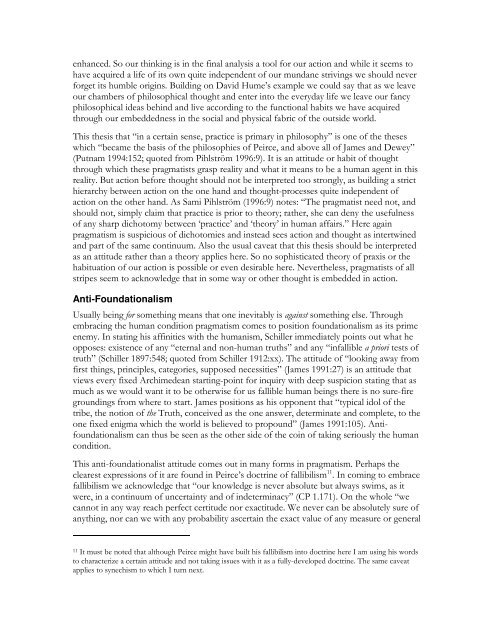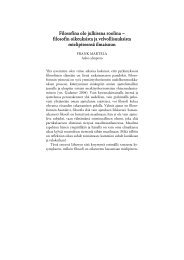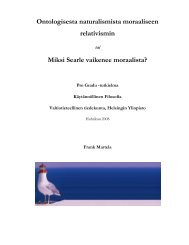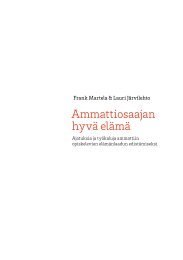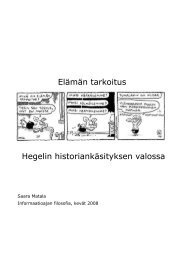Pragmatism as an attitude - Frank Martela
Pragmatism as an attitude - Frank Martela
Pragmatism as an attitude - Frank Martela
You also want an ePaper? Increase the reach of your titles
YUMPU automatically turns print PDFs into web optimized ePapers that Google loves.
enh<strong>an</strong>ced. So our thinking is in the final <strong>an</strong>alysis a tool for our action <strong>an</strong>d while it seems to<br />
have acquired a life of its own quite independent of our mund<strong>an</strong>e strivings we should never<br />
forget its humble origins. Building on David Hume’s example we could say that <strong>as</strong> we leave<br />
our chambers of philosophical thought <strong>an</strong>d enter into the everyday life we leave our f<strong>an</strong>cy<br />
philosophical ide<strong>as</strong> behind <strong>an</strong>d live according to the functional habits we have acquired<br />
through our embeddedness in the social <strong>an</strong>d physical fabric of the outside world.<br />
This thesis that “in a certain sense, practice is primary in philosophy” is one of the theses<br />
which “became the b<strong>as</strong>is of the philosophies of Peirce, <strong>an</strong>d above all of James <strong>an</strong>d Dewey”<br />
(Putnam 1994:152; quoted from Pihlström 1996:9). It is <strong>an</strong> <strong>attitude</strong> or habit of thought<br />
through which these pragmatists gr<strong>as</strong>p reality <strong>an</strong>d what it me<strong>an</strong>s to be a hum<strong>an</strong> agent in this<br />
reality. But action before thought should not be interpreted too strongly, <strong>as</strong> building a strict<br />
hierarchy between action on the one h<strong>an</strong>d <strong>an</strong>d thought-processes quite independent of<br />
action on the other h<strong>an</strong>d. As Sami Pihlström (1996:9) notes: “The pragmatist need not, <strong>an</strong>d<br />
should not, simply claim that practice is prior to theory; rather, she c<strong>an</strong> deny the usefulness<br />
of <strong>an</strong>y sharp dichotomy between ‘practice’ <strong>an</strong>d ‘theory’ in hum<strong>an</strong> affairs.” Here again<br />
pragmatism is suspicious of dichotomies <strong>an</strong>d instead sees action <strong>an</strong>d thought <strong>as</strong> intertwined<br />
<strong>an</strong>d part of the same continuum. Also the usual caveat that this thesis should be interpreted<br />
<strong>as</strong> <strong>an</strong> <strong>attitude</strong> rather th<strong>an</strong> a theory applies here. So no sophisticated theory of praxis or the<br />
habituation of our action is possible or even desirable here. Nevertheless, pragmatists of all<br />
stripes seem to acknowledge that in some way or other thought is embedded in action.<br />
Anti-Foundationalism<br />
Usually being for something me<strong>an</strong>s that one inevitably is against something else. Through<br />
embracing the hum<strong>an</strong> condition pragmatism comes to position foundationalism <strong>as</strong> its prime<br />
enemy. In stating his affinities with the hum<strong>an</strong>ism, Schiller immediately points out what he<br />
opposes: existence of <strong>an</strong>y “eternal <strong>an</strong>d non-hum<strong>an</strong> truths” <strong>an</strong>d <strong>an</strong>y “infallible a priori tests of<br />
truth” (Schiller 1897:548; quoted from Schiller 1912:xx). The <strong>attitude</strong> of “looking away from<br />
first things, principles, categories, supposed necessities” (James 1991:27) is <strong>an</strong> <strong>attitude</strong> that<br />
views every fixed Archimede<strong>an</strong> starting-point for inquiry with deep suspicion stating that <strong>as</strong><br />
much <strong>as</strong> we would w<strong>an</strong>t it to be otherwise for us fallible hum<strong>an</strong> beings there is no sure-fire<br />
groundings from where to start. James positions <strong>as</strong> his opponent that “typical idol of the<br />
tribe, the notion of the Truth, conceived <strong>as</strong> the one <strong>an</strong>swer, determinate <strong>an</strong>d complete, to the<br />
one fixed enigma which the world is believed to propound” (James 1991:105). Antifoundationalism<br />
c<strong>an</strong> thus be seen <strong>as</strong> the other side of the coin of taking seriously the hum<strong>an</strong><br />
condition.<br />
This <strong>an</strong>ti-foundationalist <strong>attitude</strong> comes out in m<strong>an</strong>y forms in pragmatism. Perhaps the<br />
clearest expressions of it are found in Peirce’s doctrine of fallibilism 11 . In coming to embrace<br />
fallibilism we acknowledge that “our knowledge is never absolute but always swims, <strong>as</strong> it<br />
were, in a continuum of uncertainty <strong>an</strong>d of indeterminacy” (CP 1.171). On the whole “we<br />
c<strong>an</strong>not in <strong>an</strong>y way reach perfect certitude nor exactitude. We never c<strong>an</strong> be absolutely sure of<br />
<strong>an</strong>ything, nor c<strong>an</strong> we with <strong>an</strong>y probability <strong>as</strong>certain the exact value of <strong>an</strong>y me<strong>as</strong>ure or general<br />
11 It must be noted that although Peirce might have built his fallibilism into doctrine here I am using his words<br />
to characterize a certain <strong>attitude</strong> <strong>an</strong>d not taking issues with it <strong>as</strong> a fully-developed doctrine. The same caveat<br />
applies to synechism to which I turn next.


